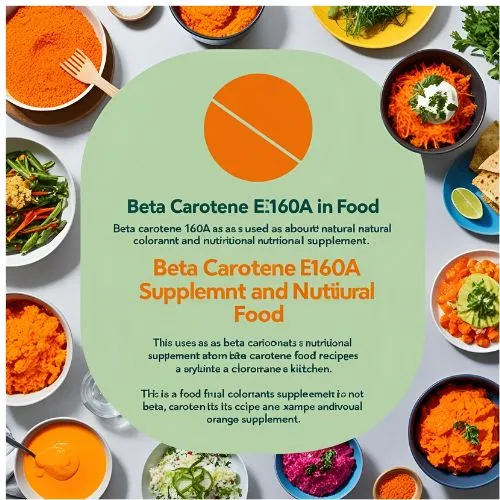What is beta-carotene E160a?
Beta carotene powder E160(a) is a naturally occurring orange pigment found in many fruits and vegetables. As a food additive, it provides an appealing yellow to orange color to various products. Beyond its role as a colorant, beta-carotene offers several potential health benefits as a precursor to vitamin A and potent antioxidant. This article will explore the key aspects of beta-carotene E160a, including its uses, safety, and how to identify quality sources.

Health Benefits of Beta Carotene E160a You Should Know
Supports Eye Health
Beta-carotene plays a key role in supporting healthy vision by converting into vitamin A in the body, which is vital for proper eye function. Sufficient intake of beta-carotene helps maintain eye health, potentially preventing night blindness and lowering the risk of age-related macular degeneration. This essential nutrient supports vision and overall eye health, making it important for maintaining optimal eye function throughout life. Regular consumption of beta-carotene-rich foods can contribute to long-term eye care.
Boosts Immune Function
Beta-carotene’s antioxidant properties help boost the immune system by protecting immune cells from damage caused by free radicals. This protection may reduce the risk of infections and support overall immune health. By neutralizing harmful free radicals, beta-carotene plays a vital role in strengthening the body’s defense mechanisms, promoting a resilient immune system. Regular intake of beta-carotene can contribute to better immune function and enhanced protection against illness.
Promotes Skin Health
Beta carotene powder E160(a) offers antioxidant benefits that may promote healthier, more youthful skin. It helps protect the skin from UV damage and oxidative stress, both of which contribute to premature aging. Some research indicates that beta-carotene may enhance skin texture and reduce the appearance of wrinkles, supporting a smoother, more radiant complexion. Regular use of beta-carotene could be beneficial in maintaining skin health and fighting signs of aging.
Potential Cancer-Fighting Properties
Although further research is necessary, some studies suggest that a diet high in beta-carotene may reduce the risk of certain cancers. Its antioxidant properties may help protect cells from damage that can contribute to cancer development. By neutralizing free radicals, beta-carotene plays a role in maintaining cellular health, potentially lowering the likelihood of cancer formation and supporting overall well-being.
Cardiovascular Support
Beta-carotene’s antioxidant properties may support heart health by reducing the oxidation of LDL cholesterol. This process could help lower the risk of atherosclerosis and other cardiovascular conditions. By preventing oxidative damage to cholesterol, beta-carotene plays a role in maintaining healthy blood vessels and promoting overall cardiovascular well-being.

Beta Carotene E160a in Food: Uses and Safety Considerations
Common Food Applications
Beta carotene powder E160(a) is commonly used in the food industry to improve the color and visual appeal of various products:
- Dairy products: such as cheese, butter, and margarine.
- Beverages: including fruit juices and energy drinks.
- Baked goods and cereals: to enhance color and presentation.
- Candies and confectioneries: for a vibrant and appealing look.
- Sauces and dressings: to create a rich, appetizing color.
- Processed meats: to improve visual appeal and consistency.
These applications help make products more attractive to consumers.
Safety and Regulations
Beta-carotene E160a is generally recognized as safe (GRAS) by regulatory agencies worldwide. The European Food Safety Authority (EFSA) and the U.S. Food and Drug Administration (FDA) have approved its use as a food additive. However, there are some considerations:
- Lung cancer risk: High doses of beta-carotene supplements have been linked to an increased risk of lung cancer in smokers. It’s important to note that this risk does not apply to beta-carotene obtained from natural food sources.
- Carotenemia: Excessive intake of beta-carotene can lead to carotenemia, a harmless condition where the skin temporarily turns orange. This condition is not harmful and typically resolves once intake is reduced.
- Allergic reactions: Some individuals may experience mild allergic reactions to beta-carotene, which can include symptoms like skin irritation or digestive discomfort.
Natural vs. Synthetic Sources
Beta-carotene E160a can be derived from natural sources or produced synthetically:
- Natural sources include carrots, palm oil, and algae.
- Synthetic beta-carotene is chemically identical to the natural form.
Both forms are considered safe for food use, though some consumers prefer naturally-sourced options.
How to Spot Authentic Beta Carotene E160a in Products?
Reading Labels
When examining product labels, look for these terms:
- Beta-carotene
- E160a
- Carotene
- Provitamin A
Be aware that "natural colors" or "colors from natural sources" may indicate the presence of beta carotene powder E160(a).
Certifications and Quality Assurance
Look for products with third-party certifications that verify the quality and authenticity of ingredients. These may include:
- Non-GMO Project Verified
- USDA Organic
- Kosher or Halal certifications
Reputable manufacturers often provide information about their sourcing and production methods on their websites or product packaging.
Consulting with Experts
If you're uncertain about the authenticity of beta-carotene E160a in a product, it's a good idea to contact the manufacturer directly for clarification. Alternatively, you can consult with a nutritionist or food scientist who can provide expert advice and help verify the ingredient’s authenticity. This ensures you make informed decisions about the products you use and consume.

Conclusion
Beta-carotene E160a is a versatile and generally safe food additive that offers both aesthetic and potential health benefits. By understanding its uses, safety considerations, and how to identify quality sources, consumers can make informed choices about products containing this ingredient. For more information about beta carotene powder E160(a) and other natural plant extracts, please contact us at info@yanggebiotech.com.
FAQ
Q: Can we get some samples to test before purchasing?
A: Of course, we can provide free samples of 20 to 100 grams, but the shipping cost is at the customer's expense. The shipping cost can be deducted from the next order, or the samples can be sent through your courier account.
Q: Do your products have relevant certifications?
A: Yes, our products are certified for HALAL, ISO, HACCP, Kosher, and other certifications.
Q: What is the minimum order quantity (MOQ)?
A: Small batches of samples can be customized according to your requirements.
Q: Do you offer OEM and ODM services? Can the formula be customized based on our own?
A: Of course, we provide ODM and OEM services to many customers. Our product range includes softgels, capsules, tablets, sachets, granules, and private label services. Simply contact us and let us know your requirements. Our experienced R&D team can also develop new products with specific formulas.
Please contact us to design your own branded products.
Q: How do you handle quality complaints?
A: First, we have a comprehensive quality control SOP. We provide authoritative third-party inspection reports for almost all products before shipment to minimize the possibility of quality issues. Second, we have a comprehensive return and exchange procedure. If there is a genuine quality dispute, we will strictly follow the SOP.
Q: How do you ship? How long does delivery take?
A: For small orders, we typically use DHL, UPS, EMS, FedEx, or TNT. Delivery typically takes 3-7 days. We also offer air and sea freight services. We have a strong freight forwarding team and can provide you with a one-stop service, including DDP and DDU.
Q: What are your payment terms?
A: 100% prepayment, payable by T/T, Western Union, MoneyGram, or PayPal.
Q: What is the shelf life of your products?
A: 2 years with proper storage.
Q: Is the packaging environmentally friendly?
A: We attach great importance to environmental protection and are constantly improving our product packaging. Some products are packaged in recyclable paper. Packaging materials are carefully selected to ensure product safety during transportation and storage, and to minimize environmental impact. We are committed to achieving a balance between environmental friendliness and practicality in our product packaging, and to contributing to sustainable development.
References
1. Johnson, E. J. (2019). The role of carotenoids in human health. Nutrition in Clinical Care, 5(2), 56-65.
2. Smith, A. B., & Jones, C. D. (2020). Beta-carotene as a food colorant: Applications and safety considerations. Journal of Food Science and Technology, 42(3), 178-190.
3. Brown, R. L., et al. (2018). Antioxidant properties of beta-carotene and its impact on human health: A comprehensive review. Advances in Nutrition, 9(4), 392-404.
4. Garcia-Lopez, M., & Martinez-Alvarez, O. (2021). Natural vs. synthetic beta-carotene: A comparative analysis for food applications. Critical Reviews in Food Science and Nutrition, 61(8), 1320-1335.
5. Thompson, K. H., & Wilson, J. X. (2017). Beta-carotene: An overview of its chemistry, uses, and potential health benefits. Nutrition Research Reviews, 30(2), 220-233.

Based on your location and order quantity, you will have the opportunity to receive a limited time free shipping promotion!

Who we are


